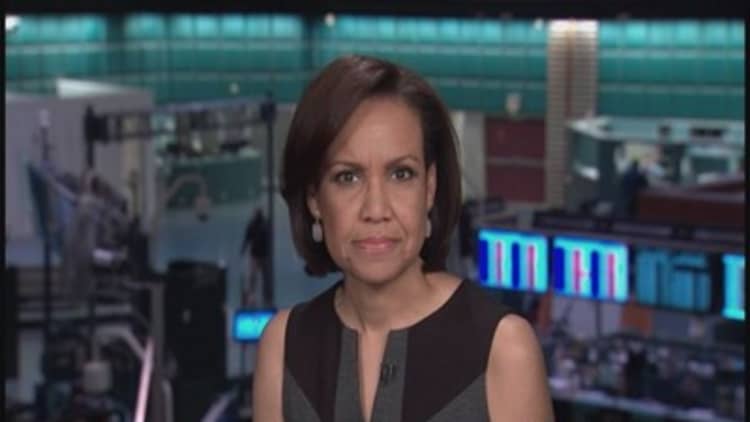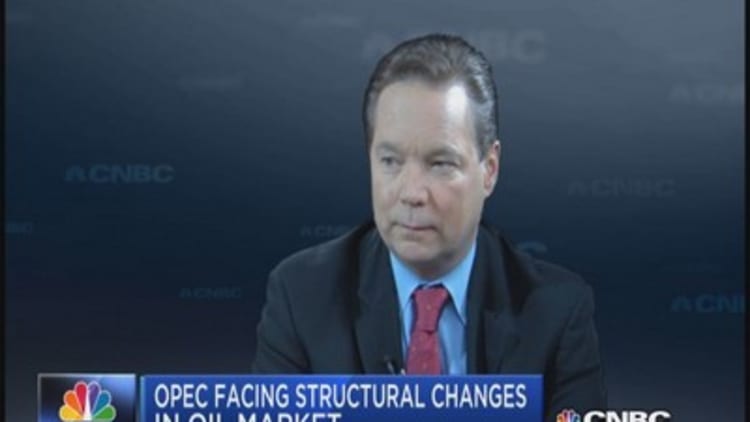
Russia revved up the oil bears ahead of what could be a momentous OPEC meeting later this week.
Traders have been speculating that the Organization of the Petroleum Exporting Countries could cut production, as some of its members have been calling for ahead of Thursday's meeting. So the appearance in Vienna, Austria, of Rosneft's chief executive, Igor Sechin, caused a swirl of rumors and talk about agreements and production cuts.
But Sechin's meeting with Saudi Arabia, Venezuela and fellow non-OPEC member Mexico did not turn up an accord, and Sechin said that Russia cannot cut production now. He said after the meeting that Rosneft may curb some capital projects that would ultimately impact supply. He also said the current oil price isn't critical for Russia.
U.S. West Texas Intermediate fell 2.2 percent to a four-year low of $74.09 per barrel. Brent also dropped and was trading at about $80 in late afternoon.

"The meeting they had in Vienna seemed to fall apart. You've got to really appreciate how the Russian bravado gets in the way of trying to talk up a market," said John Kilduff of Again Capital. "He comes out and says they can deal with Brent down to $60 a barrel. That's not how you talk up a market." Sechin was quoted by Bloomberg News as saying Russia would not need to cut production if oil fell to $60.
Read MoreUS energy production grows - so will US power
Daniel Yergin, vice chairman of IHS, said Sechin's very appearance in Vienna was significant.
"Russia in the past has said it would cut back production and hasn't, but the fact that Mr. Sechin is the most important figure in Russian energy there is a very strong message to OPEC about Russian interest in the stabilization of price. It adds to the weight of the meeting," he said.
"I think they're kind of improvising what Sechin does, and that's what (President Vladimir) Putin does," said Yergin. Russia has been hurt not only by Western sanctions but by the steep, swift drop in oil prices.
"They are showing their alarm," he said.
Both Kilduff and Yergin expect no change in production as a result of the meeting.
"I still think the Saudis appear to be in no mood or disposition to cut production right now, particularly since it would only benefit the very non-OPEC production that has driven them to this place," said Kilduff.
Oil prices have fallen about 30 percent since summer, as growing U.S. oil production has added to a supply glut. Marginal U.S. producers are already cutting back, but Kilduff said U.S. shale production would not be curbed much until prices get to $65 per barrel or lower.
Read MoreWhat retailers and restaurants may say about OPEC
Michael Wittner, head of global oil research at Societe Generale, does expect a production cut from OPEC on Thursday.
"What I think is going to happen is slightly better than even chance, call it 60 percent that they do a meaningful and widely shared cut. We're saying a million barrels a day in real crude and that could be 1.5 million barrels a day in quotas." OPEC's quota is 30 million barrels a day.
"This is a pivotal meeting that could set the stage for the oil markets for the next couple of years. We are talking about what is going to be the mechanism that balances the market from the supply side," Wittner said. "Is it going to be OPEC or the market?"
Recent comments from Saudi Arabia's oil minister that the market should set prices has convinced some analysts that the biggest oil exporter will let prices slump to drive out some of the weakest producers, particularly in the U.S. shale industry. But Wittner said Saudi Arabia would go along with agreed cuts by individual countries and a cut could stabilize prices.
Kilduff said he expects to see more swings in the price ahead of the meeting. "These OPEC ministers are not camera-shy so look for wild statements and assertions to hit the wires regularly over the next couple of days," he said. "You're going to have the usual suspects pushing for the cut—Iran, Venezuela, Ecuador and then the Saudis are going to continue to counsel and stand firm."



